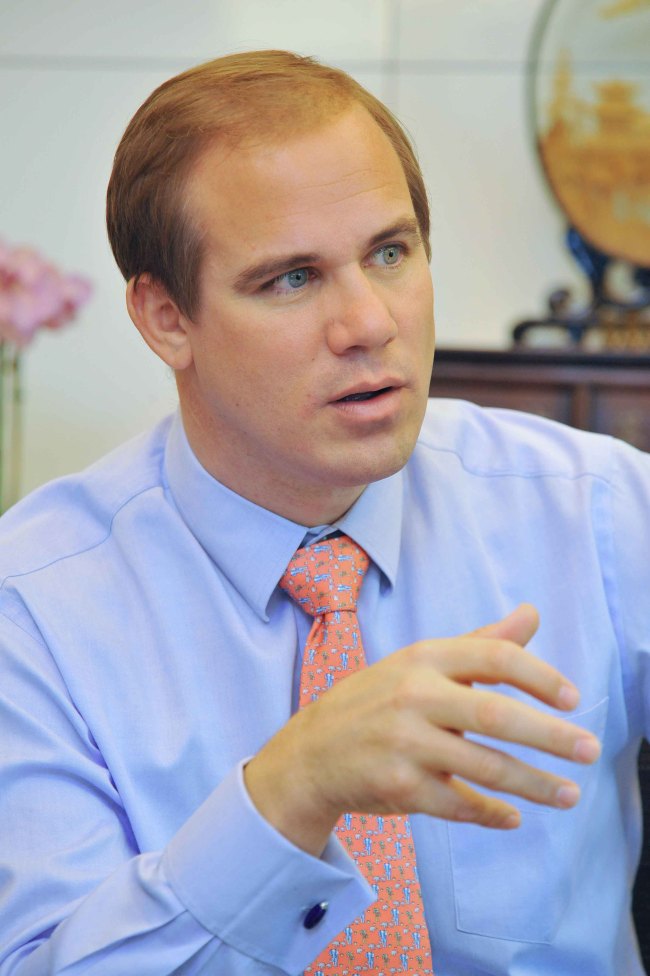It was no surprise to those who know him when Richard Hill, CEO of Standard Chartered Bank Korea, was presented with Seoul Honorary Citizenship by the city government in October.
He has made active social contributions to Korean society, and has helped enhance the city’s business environment and attract foreign investment.
His six years in Korea with his family has been full of wonderful and unique experiences.
Besides maintaining a strong work ethic, Hill said he has also made the most of the past six years here with his wife and three sons. He is a lifelong supporter of Arsenal FC; is engrossed in tennis, skiing and driving; and speaks five languages.
“I’ve been living in Seoul for the past six years and can confirm that I love living in Korea; definitely a fascinating place to live,” the British CEO told The Korea Herald.
 |
|
SC Bank Korea CEO Richard Hill speaks in his office in Seoul. (SC Bank Korea) |
“Life (here) is typified by the continual interlinkages between the old and the new that impact every part of Korean life,” Hill said.
“On the one hand, Korea has 5,000 years of the deepest history, culture and tradition, yet on the other hand, is the fastest adopter of technology anywhere in the world,” he said.
Hill joined Standard Chartered in Singapore in 2006 as the chief financial officer. He relocated to Seoul as the executive vice president in 2008, and a year later became the president and CEO of Standard Chartered Korea and its bank unit.
He feels a strong affection for Seoul, where his sons were raised, and his family shares special memories from their time in the Korean capital.
“When we first came to live in Seoul, my sons were young boys and they have literally grown up in Seoul,” he said. The Hill brothers, now 16, 18 and 20, have spent their formative years in Seoul.
The CEO described Seoul as “the most wonderful place to live: large, modern, safe, with every possible amenity or entertainment available within a short ride on the jeehacheol (subway).”
“To my sons this means shopping for electric guitar accessories at Nagwon music center, hunting for the latest IT gadgets in a Yongsan IT park or seeing the latest international rock band at the Olympic Gymnastics Stadium,” he said.
“They get a lot more freedom from their mum and dad than they would in any English or American city.”
He and his wife have a more sedate pace of life, he noted. They love to take their dogs for a walk on the Bugak Skyway above their neighborhood of Seongbuk-dong, or to take in the latest movie in Hyehwa-dong.
His most fantastic personal experience, he recalled, was when he and his sons went to help out with the oil spill on the Taean Peninsula back in 2008.
“We expected that our small group from the bank would be on our own on the beach, but we were joined by literally thousands of people from all over the country,” he reflected. “That is Korea at its best, a wonderful social harmony that brings Koreans together and makes this unique peninsula such a special place in the world.”
“The other moment of social legend is the response of Koreans to the 2002 World Cup,” said Hill, adding that he was extremely impressed by Koreans’ support for soccer, the passion of their life.
“As a board member of the Korean Football Association, this is also a particular source of pride I have in being fortunate enough to have lived and worked in this country.”
But even this “expat guru” continues to deal with “the ultimate challenge” of expat living in Korea ― the Korean language. Unlike his sons, who have grown up to speak fluent Korean, Hill found learning Korean fun but difficult, despite taking Korean lessons since arriving in Seoul.
“I wish to broaden the boundaries of my Korean skills and be able to communicate with employees and others through direct communication,” he said with a note of determination.
Asked about the traditional view that there is a core difference between how Koreans see foreign cultures and vice versa, Hill suggested that such differences have been diminishing, as can be seen through the rise of social media.
“The world is fast becoming a village and whilst we all enjoy the cultural differences that exist, these days social media probably means that there are more similarities than differences, at least in the major cities of the world,” he reflected.
“Korea is no different, with half of its economy dependant on exports from the well-known Korean brands which adorn Bond Street in London or 5th Avenue in New York.”
Speaking about the unique characteristics of the Korean people, Hill noted that they have a distinctive “sense of national identity and a strong sense of pride in the history, achievements, culture, music, food and legends” which together form the rich pattern of being Korean.
“I think foreigners are often surprised at the strength of this feeling but are also touched by the warmth in which Koreans, when they become friends, open their hearts and their families to foreign visitors,” he said.
When asked about his aspirations while living in the country, he expressed his strong support for the financial sector in its development both at home and abroad.
“I personally believe that a successful business is the one that is symbiotic with the community in which it operates,” he said.
“Standard Chartered’s own brand promise is ‘Here for Good,’ and I will continue to try to ensure that we, as I think the largest capital investor in the Korean economy, set a balanced scorecard of financial, human, environmental and social growth.”
By Chung Joo-won (joowonc@heraldcorp.com)